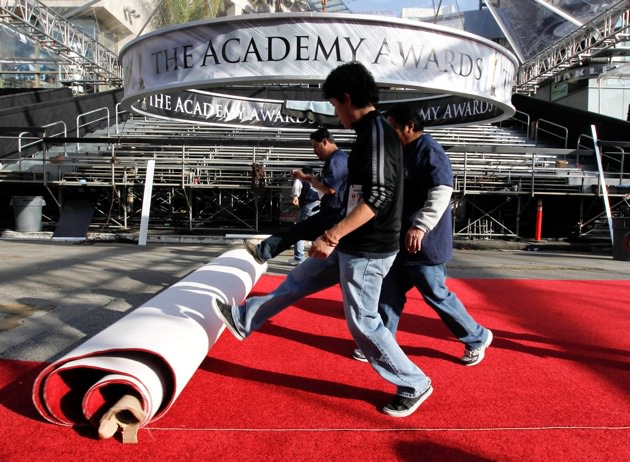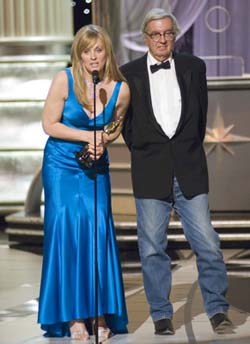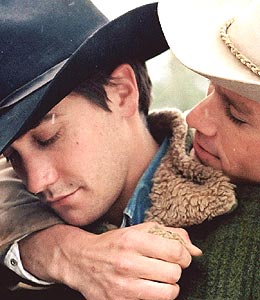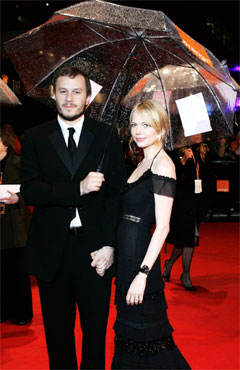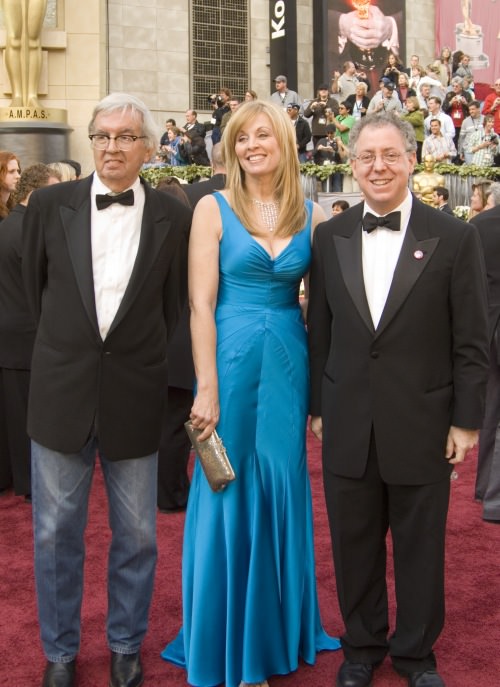Larry McMurtry and Diana Ossana, who have been collaborating on screenplays and novels since 1992, received numerous accolades for their work on the 2005 film Brokeback Mountain, directed by Ang Lee, including the Oscar for Best Adapted Screenplay. What follows is a conversation about the confusions and occasional pleasures of the annual Hollywood awards season.
Diana Ossana: What did you make of this year’s 83rd Oscar telecast?
Larry McMurtry: Jeff Bridges was the best thing about it. He was the most sincere presenter.
D: His first film was Last Picture Show. Jeff’s the best.
L: The winners have only 45 seconds to get up from their seats, make it to the stage and speak.
D: There’s a huge ticker in the back of the auditorium, ticking off the seconds remaining. When we won in 2006 I thanked our actors, Annie [Proulx], and Mark [Poirier], who gave me the story to read. Our seconds had run by the time you stepped up to the microphone, and the person way in the back was shooing me off. I was relieved they didn’t shoo you off stage.
L: I thanked all booksellers, from the humblest to the grandest. The thank-yous this year seem to have gotten out of hand. Kirk Douglas and Natalie Portman went on forever. I was very moved this year by Geoffrey Rush, the thoughtful Australian. Colin Firth gave the best acceptance speech. English snap.
D: If Colin Firth weren’t married, I’d propose to him.
L: The Hollywood awards season occupies about two months. The first challenge always seemed to be getting you adequately coiffed and made up. Your natural looks are hard to improve upon, but that didn’t prevent expensive teams of beauty technicians from laboring long.
D: I hardly wear makeup and don’t bother with my hair most days. I had to sit while strangers prodded and picked at me like monkeys with their young.
L: Thanks to the tedium of the ceremonial dinners, I chose to amuse myself by social reportage, i.e., watching what was going on at the losing tables, particularly Dreamworks and News Corp. Stephen Spielberg and Jeffrey Katzenberg were at the Dreamworks table, but no David Geffen. He had left Dreamworks by then.
D: Russell Crowe was dark and volatile and very attractive then.
L: So volatile that Dreamworks was mainly concerned with neutralizing him.
D: You’re overdramatizing.
L: The Critics Choice Awards was held at the Santa Monica Civic Center. We expected massive protests because of the gay cowboy connotation.
D: Yes, but there was only one lonely little man holding up a sign that said, “No homos on the range.”
L: We won Best Picture from the film critics. You were both producer and co-screenwriter but didn’t expect to win, so you didn’t have a speech ready, or a list of people to thank.
D: It was much easier accepting the award for Michelle Williams, who shared a Best Actress win with Amy Adams. I was stunned when we won Best Picture. Ang [Lee, who directed Brokeback Mountain] and Michael Costigan both pushed me out of my chair and up onto the stage.
L: It was our first exposure to the Red Carpet, a weird anthropological ritual, at which journalists yell questions at you, most of which you can’t hear. It was our first exposure to the use of wranglers, too, kids that find you your car after these events.
D: But they also keep track of you if you win so that you don’t wander off into the night—an extremely troublesome habit of yours—without first going backstage and answering hundreds of questions by the press and having your picture taken.
L: The capitol of tedium was the Los Angeles Film Critics Awards ceremony. Because it wasn’t televised, it was interminable.
D: Five and a half hours sitting at a table, listening to every journalist in Los Angeles who had ever written a film review.
L: Most of them were obviously hacks.
D: You’re a tough audience; many of them were smart and funny.
L: There was nothing remotely tasty to eat, but that didn’t stop James Schamus, the head of Focus Features, from eating both his and my dinners. I thought the night would never end.
D: I bet James ate your food because he had no time between running a movie studio and promoting the film to grab any kind of proper meals. He was likely starving by the time he sat down at those dinners.
L: The Golden Globes are voted on by the foreign journalists. It was held at the Beverly Hilton and had a major Red Carpet, extending for miles around the hotel.
Advertisement
D: I wouldn’t know. I missed the Red Carpet at the Golden Globes. It’s second only to the Oscars, and I almost didn’t attend at all.
L: I was horrified.
D: By what?
L: By you almost not going.
D: I was a mess. It was the hair person’s fault. My daughter Sara had given her specific instructions on how to do my hair, since I’m clueless in that regard. When the woman was finished, I experienced one of the very few meltdowns I’ve had in my life. I looked like Shirley Temple.
L: You were sobbing and kept saying you didn’t belong there. You wanted to stay at the hotel and watch it on television, and you insisted I go on without you. So I left. Sara stayed, and her composure won the day
D: Sara grabbed me by the shoulders, told me to get a grip, put ice on my face and repaired my hair.
L: I was in a high state of tension until you appeared.
D: You’ve known for years that I have terrible stage fright. And then when we won, you thanked your typewriter.
L: Which amused Harrison Ford, our presenter.
D: He wasn’t amused when you disappeared on our way to the pressroom. Where did you go, anyway?
L: I went to the men’s room and returned to our table.
D: Which is exactly what you were told beforehand by Amanda [Amanda Lundberg, our publicist] not to do.
L: I forgot.
D: No, you didn’t. You’re perverse. We had to send Sara to find you. The man in charge of the press line kept asking Harrison, “Where is Larry McMurtry?” Harrison told him three times that he didn’t know where you were.
L: And the picture of the man looking for me in Harrison Ford’s pocket while you looked on benignly made the front page of the LA Times the next day.
D: Didn’t you approach the Dreamworks table after the Globes?
L: I shook hands with a wan Jeffrey Katzenberg. I reminded him that when he was at Disney, he once rejected a pitch of mine in about three seconds. It was about a western starring Eddie Murphy.
D: He remained wan. Rupert Murdoch was there, too.
L: Why he attended such a limp event I can’t imagine.
D: Maybe his wife wanted a little social action.
L: As we were leaving, Murdoch said, “Hello, Larry,” and shook my hand. The power of victory, since I’d never met the man.
D: The Writers Guild Awards were after that. We almost didn’t get inside.
L: That’s because Dan Rather was being interviewed in line in front of us and wouldn’t turn loose of the microphone.
D: Sara was with us that night.
L: And our friend Diana Choi, who was with Tom Hanks at Playtone then. When they announced us winners of Best Adapted Screenplay and our presenter suddenly appeared, I looked around and you weren’t there.
D: I was in the loo.
L: One of our wranglers found you and you came rushing out. In my panic I flipped my raspberry sorbet onto my shirt.
D: You looked like you’d tried to commit hari-kari. Amy Adams handed us our awards and was gracious enough to ignore your shirt.
L: Yes. Amy Adams is adorable.
D: And talented. She was stellar this year in The Fighter.
L: I wanted to go to London for the BAFTAs so I could visit my good friend John Saumarez Smith at the great bookshop Heywood Hill, the one in Mayfair that he ran for nearly forty years.
D: He had some of the best books I’ve ever seen. I was too sick and beaten down from travel to fly to London. We were instructed by the studio to write an acceptance speech anyway, in case we won.
L: We wanted Heath [Ledger] to accept for us if we won.
D: We won, and he read what we wrote. We watched it on television, remember? The ceremony was short and amusing …
L: … and done with a lot of British class. It made the Hollywood awards seem vaguely seedy. Jake won Best Actor and was shocked. He was so used to losing he didn’t expect it at all.
D: I wish we’d been able to attend. Jake was over the moon about winning.
L: I was burned out by this time.
D: You were burned out after the Critics Choice awards.
Advertisement
L: We went to the Directors Guild Awards in support of Ang. James ate my food again.
D: Jake and Heath did an endearing little comedic routine about Ang before the awards were announced. They seemed so young, without a care in the world.
L: It was about this time that I’d begun to wonder, “If it feels this bad to attend these affairs and win, what must it feel like to be here and lose?”
D: That’s because you have the attention span of a gnat. Unless the stage is lined with beautiful women, you have no interest at all in what’s happening up there.
L: The Directors Guild and Producers Guild Awards were essentially interchangeable.
D: You thought that because you weren’t up for those awards.
L: From my perspective, they were interchangeable, i.e., boring.
D: Like I said …
L: I remember running into George Clooney after the Producers Guild Awards in the hallway as we were leaving.
D: He congratulated you, but never made eye contact with me. It was as if I didn’t exist.
L: And it was you who’d won the award, not me.
D: He did the same thing in the green room at the Venice Film Festival. I was standing next to Ang when Clooney came in and hurried over to congratulate him. Life is mixed pickles, especially in Hollywood.
L: The best event was the luncheon at the home of Barry Diller and Diane Von Furstenberg before the Independent Spirit Awards.
D: It was a gigantic picnic. Everyone was lying about on blankets.
L: Isn’t that where Warren Beatty said there wasn’t a false note in Brokeback?
D: Yes. He was behind me in line at one of the food tables. We chatted some about producing, and he told me he’d actually forgotten his film Reds had lost Best Picture. He also said that if by chance Brokeback lost, I shouldn’t be too upset, because no one would remember that it lost twenty years from now …
L: … which will be true. We did win Best Picture at the Independent Spirit Awards.
D: Just goes to show how intelligent indie folks are.
L: And then there were the Oscars.
D: And your jeans.
L: The Kodak Theatre is on Hollywood Boulevard …
D: … which means you get the Hollywood Hills as a backdrop to the Red Carpet.
L: Hundreds of people howling in the Hills. We’d hear this tremendous yowl, and we’d turn around to look to see what god or goddess has arrived, expecting Jack Nicholson or Angelina Jolie and Brad Pitt …
D: … and it turned out to be Gary Busey.
L: When we first stepped onto the Red Carpet, I felt a little like Captain Cook must have felt walking ashore in the Hawaiian Islands just before he was bludgeoned to death.
D: It was a very long Red Carpet.
L: You wore a dress from a little-known Italian line, M Siamo.
D: I was loyal to my heritage.
L: One interesting thing is that we got to experience the profession of seat holders. There can be no empty spaces in the Oscar audience. When a nominee would leave his or her seat for some reason, a young seat holder would take their place.
D: You had a lot of bladder anxiety, since there’s no guarantee you can be let back in after a visit to the loo.
L: My jeans created a sensation, since I couldn’t find my tuxedo pants.
D: You had your tuxedo pants. When I saw you wearing jeans, I said you would look nice in a full tuxedo, and you snapped back that you didn’t want to be uncomfortable sitting in the auditorium for five hours at one stretch.
L: Jon Stewart was colorless as the host.
D: He commented on your jeans, though. He said he didn’t know you could wear jeans to the Oscars.
L: He was snippy about my Levis. He said next time he’d wear his overalls. I didn’t think he was quite large enough for that stage.
L: We lost Best Picture, startling Jack Nicholson, who opened the envelope.
D: Did he mouth “Fuck!” when he opened the envelope?
L: I believe he did.
D: He told me afterwards that he voted for Brokeback.
L: We lost because ours was a rural story, and Crash was not only urban, but also locally made. America is so urban now, people can’t truly grasp the reality of rural life anymore.
D: I was most disappointed for our crew who worked on the movie. They were gallant and determined the entire time we were filming.
L: You were right there beside them the whole time.
D: You know, I thought you deserved to be up there more than anyone in that theatre.
L: Why?
D: Because films derived from your writing have gotten 13 Oscars and 34 Oscar nominations.
L: No comment.
D: That’s a first.


